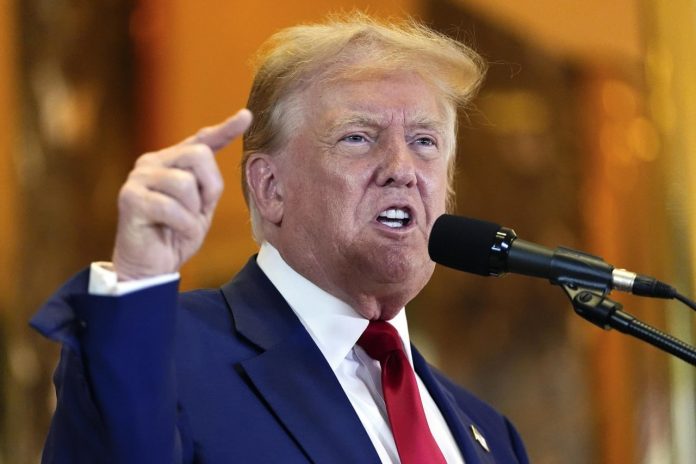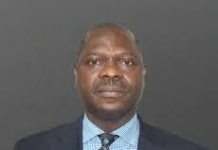By Yankuba Jallow with New Narratives
In a significant shift in U.S. foreign policy towards Sub-Saharan Africa, Ambassador Troy Fitrell, Senior Bureau Official for the Bureau of African Affairs at the U.S. State Department announced a dramatic shift in US foreign policy in Africa last month, which he said was aimed at transitioning the U.S.-Africa relationship from one rooted in aid to one driven by trade and investment.
The announcement was made during a digital press briefing hosted by the U.S. Department of State’s Africa Regional Media Hub on May 20, following Fitrell’s recent diplomatic mission to West Africa, including a visit to Côte d’Ivoire. The briefing, which was attended by journalists from across the continent, featured Fitrell alongside U.S. Ambassador to Côte d’Ivoire, Jessica Davis Ba. Both officials emphasized a reorientation of U.S. engagement in Africa under President Donald Trump toward an investment-led approach,which they said was intended to foster mutual economic growth, deepen commercial ties, and catalyze large-scale infrastructure and private sector projects.
“For decades, we’ve been defined by an assistance-led paradigm,” Ambassador Fitrell said in his opening remarks. “We are now very directly and very intentionally shifting that toward an investment-led strategy—one that is based on what actually works.”
Fitrell, who spent time in Côte d’Ivoire with Ambassador Davis Ba, unveiled the new strategy during his speech at the AmCham Business Summit in Abidjan. The summit brought together American Chambers of Commerce from across West Africa, which they claimed marked a new chapter in regional economic collaboration—especially in Francophone countries, which U.S. diplomats said have often been underserved due to language and institutional barriers.
Fitrell claimed the evolving strategy is already yielding tangible outcomes.
“Just last week in Abidjan, we ended up signing three memoranda of understanding with the host government, as well as six new commercial deals worth over $550 million,” he said. “In the first hundred days of this administration, we’ve seen 33 new deals totaling more than $6 billion.” Ambassador Davis Ba added that the deals signed during the West Africa CEO Forum included bilateral and regional investments exceeding $700 million, with a focus on digital transformation, clean energy technologies, and infrastructure, including oil refinery development and innovations in the energy sector.
While the concept of “Trade, not Aid” has been a refrain among U.S. policymakers since the early 2000s, Fitrell was candid about the slogan’s limitations. “Washington has an absolute love of rhyming slogans, but I prefer to call it an investment-led strategy,” he said. “Trade implies an exchange between equals, which is more sustainable and respectful than the donor-recipient dynamic that assistance models often create.” At the heart of the strategy is a redefinition of U.S. ambassadors’ roles on the continent.
“I have tasked every American ambassador in Africa to proactively identify commercial opportunities, advocate for American companies, engage with host governments on market reforms, and support a transparent and enabling business environment,” Fitrell explained. “This is a fundamental shift from passive engagement to strategic advocacy.”
This change comes as the new administration of President Donald Trump slashes nearly $60 billion dollars in aid to Africa and embarks on a new policy that ends Washington’s decades long focus on human rights, justice and good governance in Africa. It is reported that $12.1 billion was spent in sub-saharan countries as aid. Trump has made clear that he is only interested in limiting illegal immigration from the country and the deals he could do. The administration shut down USAID which was providing billions in medical support, drugs, food assistance and development aid to the continent. Documents obtained by the New York Times have revealed plans to potentially close a number of embassies on the continent including the one in Banjul. Experts said the U.S. foreign aid cuts will be a devastating blow to The Gambia, leaving it more vulnerable to health crises, economic shocks, and democratic backsliding. The reduction in funding could cripple essential programs in healthcare, education, and governance reform, many of which rely heavily on USAID support. Analysts warn that the loss of American assistance—especially in areas like maternal health, youth empowerment, and transitional justice—will set back hard-won gains and undermine the country’s post-dictatorship recovery efforts.
The cuts have also threatened the country’s ambitious plans for a $60 million court to try former president Yahya Jammeh. The estimated cost for the implementation of the truth commission recommendations is $160 million. The government was hoping the US would provide a significant share of those funds.
Experts in transitional justice in the Gambia believe that the aid cut would affect the transitional justice process, but they are all positive that the process will continue despite the challenges.
This change in focus also includes increased coordination between various U.S. government agencies, such as the U.S. International Development Finance Corporation (DFC) and the Department of Commerce. Davis Ba highlighted the establishment of a new DFC office in Abidjan staffed with French-speaking officers as a sign of commitment to overcoming historic linguistic and operational divides in Francophone West Africa.
Such blended finance mechanisms—where public funds are used to leverage larger private investments—are a central feature of the commercial diplomacy strategy. Projects extend across sectors including LNG production, telecommunications, fintech (including mobile money platforms), and energy generation. Asked by Gambian journalist Omar Bah about where to find data on these investments, Fitrell acknowledged the need for better documentation and transparency. “We are in the process of publishing a fact sheet that will outline all the deals finalized so far this year,” he said. “These will be available soon and supplemented by regular updates on our social media platforms.”
Responding to questions from Senegalese journalist Malik Kane about the African Growth and Opportunity Act (AGOA), Fitrell offered measured optimism about its future while stressing that decisions around its renewal reside with Congress. “AGOA is an Act of Congress, and any renewal or revision must come from Capitol Hill,” he said. “That said, we expect any reauthorization to reflect the current global economic landscape, with more emphasis on reciprocity and fair trade.” Fitrell encouraged African nations to actively lobby for AGOA’s renewal and modernization. “Some countries are already negotiating bilateral agreements with the U.S. Trade Representative. These efforts are essential, and we’re helping our partners navigate the U.S. legislative and trade policy systems,” he said.
When asked how media can support this evolving U.S.-Africa economic relationship, Fitrell emphasized the importance of public accountability and storytelling. “Media has a vital role in tracking progress, sharing success stories, and ensuring transparency,” he said. “By highlighting investments, flagging challenges, and showcasing local entrepreneurs, journalists can help drive momentum and trust in these partnerships.” Ambassador Davis Ba echoed this sentiment, pointing to media coverage of U.S.-funded initiatives as a key factor in attracting more investment and fostering a climate of public engagement. “What we do needs to be visible and understandable to African audiences, and that’s where journalists come in,” she added.
Ultimately, both officials framed the strategy as a response to the evolving aspirations of African nations and a recognition of the continent’s central role in global economic growth. “Africa’s youth, dynamism, and innovation are unparalleled,” Fitrell said. “This strategy reflects our belief in Africa not as a problem to be solved, but as a partner to be embraced.” The digital briefing ended with a promise to keep the conversation going—not just through future engagements but also through practical, measurable outcomes. “We’ve said it for years,” Fitrell concluded, “but now we’re doing it. The U.S. is all in on commercial diplomacy in Africa. And we’re just getting started.”
The U.S.-Africa relationship has undergone various transformations over the decades—from Cold War alliances to post-9/11 security partnerships, to the more recent emphasis on development and humanitarian assistance. Programs like PEPFAR, Power Africa, and the Millennium Challenge Corporation have been central pillars of U.S. engagement. However, with rising competition from China, the European Union, and Gulf states in African markets, the Biden administration and its successors have sought to recalibrate America’s Africa policy to focus on sustainable, market-driven partnerships. The new commercial diplomacy strategy also arrives amid growing African calls for self-determination and mutual respect in global affairs. With a young population projected to double by 2050 and urbanization and digital innovation on the rise, African economies are increasingly seen as engines of future global growth. As geopolitical competition intensifies and global supply chains diversify, Fitrell’s visit and the strategy he unveiled could mark a defining moment in U.S.-Africa relations—one not only of rhetoric but of realignment and results.
The Ministry of Finance of the Gambia were contacted for comments, but they have still not responded despite the repeated requests.
The Gambia launched an ambitious 5-year plan to implement the recommendations of the truth commission that investigated the past human rights abuses of the 22-year rule of former President Yahya Jammeh. The estimated cost is $160 million. The overwhelming majority of this fund will come from foreign aid, particularly the US Government. The aid cut by the US will greatly affect this implementation plan and the Gambia has moved to seek support from the African Union, World Bank and ECOWAS while anticipating that the US government will consider the transitional justice process of the Gambia. The Gambia Government in 2025 did not cater for the establishment of the Special Tribunal for The Gambia. The timeline for the implementation of the TRRC recommendations is between 2023 and 2027. The Special Tribunal for The Gambia is estimated to cost $60 million. The Gambia will also embark on prosecution and also paying reparations. The amount to be paid to each victim will be decided by the Reparations Commission.
Ida Persson, Special Advisor to the Minister of Justice on transitional justice, in our previous interview acknowledged the financial challenges but said she remained hopeful. She said the government is seeking alternative funding from the European Union, African Union, and United Nations. But she acknowledged the U.S. aid freeze is particularly challenging for efforts to set up the court. “We are doing everything we can to ensure that the work of the TRRC continues and that victims receive the justice they deserve,” Persson said.
The announcement means the Gambia has to look out for other avenues other than heavy reliance on the US government for funding. The US government is the biggest funder of the transitional justice process in Africa.
This story was a collaboration with New Narratives as part of the West Africa Justice Reporting Project.



















